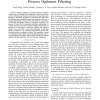Free Online Productivity Tools
i2Speak
i2Symbol
i2OCR
iTex2Img
iWeb2Print
iWeb2Shot
i2Type
iPdf2Split
iPdf2Merge
i2Bopomofo
i2Arabic
i2Style
i2Image
i2PDF
iLatex2Rtf
Sci2ools
IJCNN
2006
IEEE
2006
IEEE
A Monte Carlo Sequential Estimation for Point Process Optimum Filtering
— Adaptive filtering is normally utilized to estimate system states or outputs from continuous valued observations, and it is of limited use when the observations are discrete events. Recently a Bayesian approach to reconstruct the state from the discrete point observations has been proposed. However, it assumes the posterior density of the state given the observations is Gaussian distributed, which is in general restrictive. We propose a Monte Carlo sequential estimation methodology to estimate directly the posterior density. Sample observations are generated at each time to recursively evaluate the posterior density more accurately. The state estimation is obtained easily by collapse, i.e. by smoothing the posterior density with Gaussian kernels to estimate its mean. The algorithm is tested in a simulated neural spike train decoding experiment and reconstructs better the velocity when compared with point process adaptive filtering algorithm with the Gaussian assumption.
Related Content
| Added | 11 Jun 2010 |
| Updated | 11 Jun 2010 |
| Type | Conference |
| Year | 2006 |
| Where | IJCNN |
| Authors | Yiwen Wang 0002, António R. C. Paiva, Jose C. Principe |
Comments (0)

